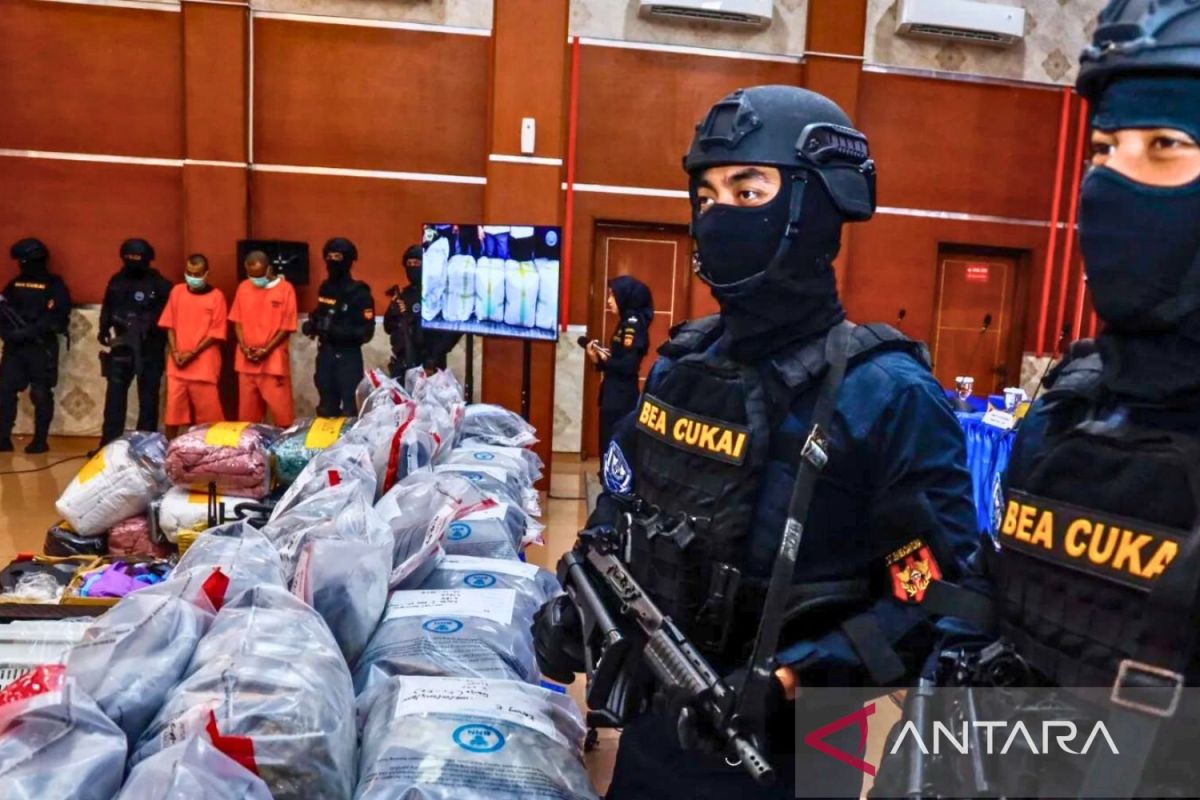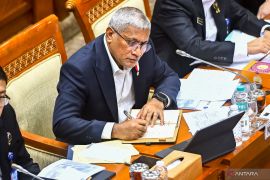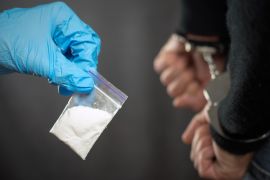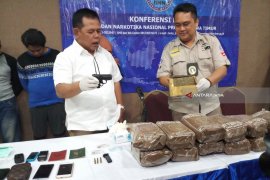Jakarta (ANTARA) - The World Drug Report (WDR) 2023, issued by the United Nations Office on Drugs and Crime (UNODC), reported that as of 2021, the number of drug addicts globally reached 296 million people.
This figure increased by 12 million people as compared to the previous year and represented 5.8 percent of the world's population aged 15-64 years.
Of the total number of global drug addicts, more than 39 million face drug use-related health problems.
In Indonesia, the results of the National Survey on the Prevalence of Drug Abuse in 2023 showed a prevalence rate of 1.73 percent, or equivalent to 3.3 million Indonesians aged 15-64 years.
The data also showed a significant increase in drug abuse among people in the age group of 15-24 years.
The 3.3 million people are a permanent market for the illicit trafficking of narcotics. This market could grow rapidly if not handled properly.
Drug trafficking is not merely related to the illegal drug business or a market problem but also threatens the mental and physical health of the users.
Hence, the problem of illegal drug trafficking is a threat to humanity that can destroy civilization.
Recently, the Indonesian National Narcotics Agency (BNN), along with the Directorate General of Customs and Excise of the Indonesian Ministry of Finance, succeeded in thwarting the smuggling of 214 packages of marijuana from Thailand, with a net weight of 113.65 kilograms, destined for Liverpool, England.
The marijuana was sent by an Indonesian citizen, with the initials BN, from Thailand to AS and MM in Indonesia, hidden in packages of camping equipment, baby equipment, vacuum cleaners, and bed covers.
Head of the National Narcotics Agency (BNN), Commissioner General Marthinus Hukom, stated that the smuggling of marijuana by concealing it in various equipment is a new modus operandi. Moreover, Indonesia is being used as a transit country for marijuana shipments from Thailand to England.
This strange phenomenon has caught BNN’s attention. Considering that Thailand is one of the countries that legalized marijuana, why bother stopping at Indonesia for transit?
Indonesians as drug couriers
The three perpetrators involved in this marijuana smuggling from Thailand are Indonesian citizens. One of them, with the initials BN and still a fugitive and living abroad, was confirmed to be working with other citizens or part of an international narcotics syndicate.
Meanwhile, AS and MM are employees and owners of PT CAS who carried out the order to receive the shipment of the prohibited goods from Thailand.
Based on BNN's estimation, the 214 packages of marijuana are worth a total of around Rp25 billion (US$1.5 million), with the calculation that one package of marijuana has a gross price of Rp120 million (US$7 thousand).
With this price, the reward received by AS and MM for handling the packages was given in the form of a car worth more than Rp300 million (US$17 thousand) if the order was successfully delivered to England.
AS and MM were already rewarded mobile phones for receiving the marijuana packages. However, the car prize was not given as the joint team of BNN and Customs had thwarted the smuggling of marijuana packages before being sent to England.
The phenomenon of Indonesian citizens being taken abroad to become couriers or intermediaries for the distribution of narcotics is currently rampant. Recently, an Indonesian citizen was arrested for working as a middleman for the distribution of illegal narcotics in Addis Ababa, Ethiopia; India; Tokyo, Japan; to Brazil.
Reflecting on those cases, the scheme of illegal narcotics distribution is now increasingly diverse in accordance with technological developments, human logic, and law enforcement’s efforts to detect it.
The more law enforcement officers succeed in detecting a modus operandi, the more likely the dealers are to change it.
Hence, serious efforts are needed to prevent a new modus operandi for narcotics distribution, including sharing information and experiences between law enforcers.
Meanwhile, the mode of transiting narcotics packages prior to being sent to a certain destination country is not a new method in the distribution of illegal narcotics. The existence of a cell system of the perpetrators involved also supports this.
This practice is usually one of the methods of organized criminal groups to hinder or complicate law enforcement efforts against the illicit trafficking of narcotics that have a transnational character.
A criminal law expert from Padjajaran University, Sigid Suseno, suggested several steps to prevent and detect these methods by deeply understanding the various modes of transnational illicit trafficking of narcotics and their distribution tendencies.
Furthermore, the optimization of information technology is deemed necessary in addition to steps to tighten the entry of people and goods from and out of Indonesia.
Collaboration
Collaboration between institutions, both national and international, to prevent and eradicate the illicit trafficking of narcotics is also necessary, such as between the Police, BNN, the Directorate General of Immigration of the Ministry of Law and Human Rights, Customs, and others.
Moreover, partnering with the police, other state institutions, and the International Criminal Police Organization (Interpol) is deemed crucial.
Collaboration is needed, as narcotics circulation is not merely about law enforcement. Drugs are causal to a broad spectrum of problems.
Various drug smuggling schemes to various potential symptoms of members of society being exploited, reeling from poverty, and facing social and border problems further snowball into issues that must be addressed cross-sectorally.
The importance of collaboration has been proven in the case of marijuana smuggling from Thailand to Indonesia, where the disclosure of 214 packages of marijuana weighing 113.65 kg began with information from Customs officers at Soekarno-Hatta Airport, Tangerang, Banten.
Customs officers, who grew suspicious of the package from Thailand that allegedly contained narcotics, also informed the BNN, which was then followed up by a joint BNN-Customs team with further investigation.
In addition to this case, Director General of Customs and Excise of the Ministry of Finance Askolani stated that at least 726 Customs actions related to narcotics, psychotropics, and precursors (NPP) have been carried out in collaboration with the BNN, the Criminal Investigation Unit of the National Police, and the Indonesian Defense Forces (TNI) since early 2024 until now.
The 726 actions related to NPP include 346 actions via air, 276 expedition actions, 46 actions via sea, and 40 actions via land.
From these various cases, the modus operandi of NPP was found in passenger goods, shipments, and other illegal activities. Meanwhile, the countries of origin for the illegal entry of goods are Malaysia, Vietnam, China, Thailand, and the Netherlands, among others.
Such actions taken by Customs and Excise, along with other officials, show a collaboration to deal with the threat of narcotics, as well as send a strong message to drug lords, distributors, and syndicates that Indonesia is serious about eradicating drugs.
In the future, collaboration is expected to come not only from across government agencies but also from broader cooperation, starting from governmental agencies, the community, and various elements of anti-drug activists.
By joining hands to prevent the entry of drugs into Indonesia, all parties can fill the loopholes that drug lords and illegal drug dealers have used to grow their illegal business.










